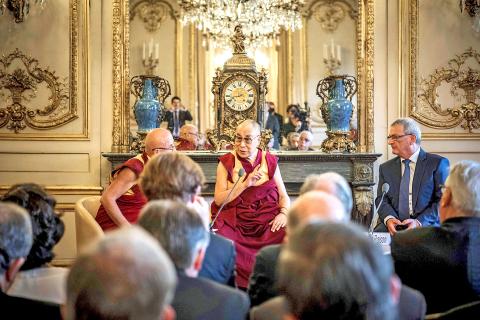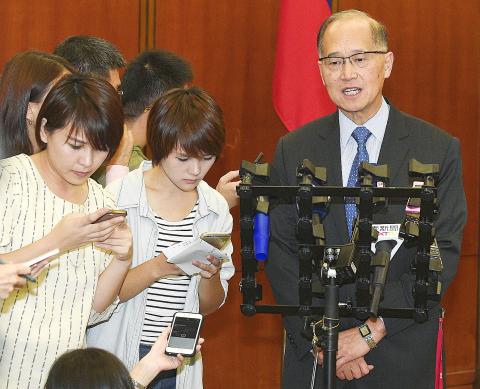China yesterday warned Taiwan not to allow exiled Tibetan spiritual leader the Dalai Lama to visit, after New Power Party Legislator Freddy Lim (林昶佐) issued an invitation.
President Tsai Ing-wen (蔡英文) has not said whether the government would allow a visit by the Dalai Lama, who congratulated Tsai on her “remarkable” victory in the Jan. 16 election.
Lim, an outspoken critic of Beijing, invited the Dalai Lama when he met him in India last week.

Photo: AFP
Ma Xiaoguang (馬曉光), spokesman for China’s Taiwan Affairs Office, told a regular news briefing in Beijing that the Dalai Lama “wears religious clothes to carry out separatist activities.”
“The intention of some forces in Taiwan to collude with separatists seeking ‘Tibet independence’ and to create disturbances will have a severe impact on relations across the Taiwan Strait,” Ma said. “We firmly oppose any form of visit.”
Lim’s assistant, Kenny Chang (張庭瑜), said that the Dalai Lama is highly respected in Taiwan and that Lim invited him “to share his ideas and religious philosophy.”

Photo: Chen Chih-chu, Taipei Times
On Tuesday, Minister of Foreign Affairs David Lee (李大維) told lawmakers that if the Dalai Lama decided to come, the ministry would review the matter carefully, Chinese-language media reported.
A ministry spokeswoman told reporters: “If he submits his [visa] application, the government will handle it based on relevant rules.”
Tenzin Taklha, an aide to the Dalai Lama in Dharamsala, India, the seat of the Tibetan government-in-exile, declined to comment yesterday when reached by telephone.
The Dalai Lama is currently on a visit to Europe. Yesterday he met with a group of French lawmakers at the Senate in Paris.
Former president Ma Ying-jeou (馬英九) refused the Dalai Lama entry several times after his last visit to Taiwan in 2009.
In 2008, the Democratic Progressive Party (DPP) criticized Ma’s administration for refusing to grant the Dalai Lama entry.
According to the Chinese-language Liberty Times (the Taipei Times’ sister newspaper), at the time Tsai characterized the Dalai Lama as “a friend of Taiwan” who was denied entry because Ma Ying-jeou was “afraid of China.”
She was quoted as saying that the nation should not be intimidated by China and that as DPP chairperson, she would be “steadfast in defending” this position.
Presidential Office spokesman Alex Huang (黃重諺) yesterday said that the office “would not comment on a hypothetical case.”
DPP spokesman Yang Chia-liang (楊家俍) last night said the DPP has long been concerned with religious freedom in China.
The government has rules it must follow in issuing visas and the DPP respects that, he said.
DPP Legislator Gao Jyh-peng (高志鵬), approached as he was leaving a Central Standing Committee meeting at the DPP’s headquarters in Taipei, said that he hoped the government would “tough it out” to welcome the Dalai Lama.
“From the perspective of the freedom of speech and asserting Taiwan’s sovereign independence, we have no cause to follow the example of the Ma [Ying-jeou] administration in refusing the Dalai Lama’s visit,” Gao said.
Additional reporting by Su Fang-ho

Tropical Storm Gaemi strengthened into a typhoon at 2pm yesterday, and could make landfall in Yilan County tomorrow, the Central Weather Administration (CWA) said yesterday. The agency was scheduled to issue a sea warning at 11:30pm yesterday, and could issue a land warning later today. Gaemi was moving north-northwest at 4kph, carrying maximum sustained winds near its center of up to 118.8kph and gusts of 154.8kph. The circumference is forecast to reach eastern Taiwan tomorrow morning, with the center making landfall in Yilan County later that night before departing from the north coast, CWA weather forecaster Kuan Shin-ping (官欣平) said yesterday. Uncertainty remains and

SEA WARNING LIKELY: The storm, named Gaemi, could become a moderate typhoon on Wednesday or Thursday, with the Taipei City Government preparing for flooding A tropical depression east of the Philippines developed into a tropical storm named Gaemi at 2pm yesterday, and was moving toward eastern Taiwan, the Central Weather Administration (CWA) said. Gaemi could begin to affect Taiwan proper on Tuesday, lasting until Friday, and could develop into a moderate typhoon on Wednesday or Thursday, it said. A sea warning for Gaemi could be issued as early as Tuesday morning, it added. Gaemi, the third tropical storm in the Pacific Ocean this typhoon season, is projected to begin moving northwest today, and be closest to Taiwan on Wednesday or Thursday, the agency said. Today, there would likely

DISRUPTIONS: The high-speed rail is to operate as normal, while several airlines either canceled flights or announced early departures or late arrivals Schools and offices in 15 cities and counties are to be closed today due to Typhoon Gaemi, local governments announced last night. The 15 are: Taipei, New Taipei City, Taoyuan, Tainan, Keelung, Hsinchu and Kaohsiung, as well as Yilan, Hualien, Hsinchu, Miaoli, Chiayi, Pingtung, Penghu and Lienchiang counties. People should brace for torrential rainfall brought by the storm, with its center forecast to make landfall on the east coast between tonight and tomorrow morning, the Central Weather Administration (CWA) said. The agency issued a sea warning for the typhoon at 11:30pm on Monday, followed by a land warning at 11:30am yesterday. As of

CASUALTY: A 70-year-old woman was killed by a falling tree in Kaohsiung as the premier warned all government agencies to remain on high alert for the next 24 hours Schools and offices nationwide are to be closed for a second day today as Typhoon Gaemi crosses over the nation, bringing torrential rain and whipping winds. Gaemi was forecast to make landfall late last night. From Tuesday night, its outer band brought substantial rainfall and strong winds to the nation. As of 6:15pm last night, the typhoon’s center was 20km southeast of Hualien County, Central Weather Administration (CWA) data showed. It was moving at 19kph and had a radius of 250km. As of 3pm yesterday, one woman had died, while 58 people were injured, the Central Emergency Operation Center said. The 70-year-old